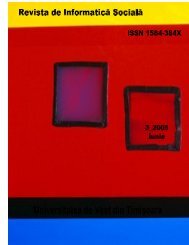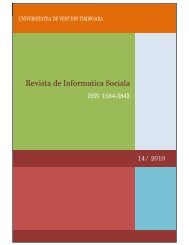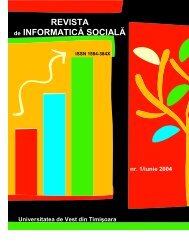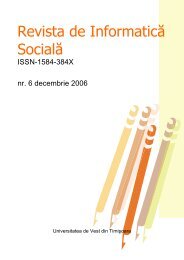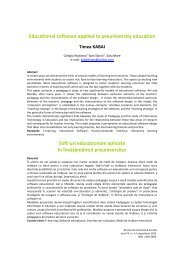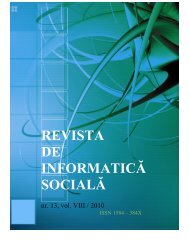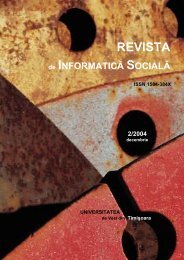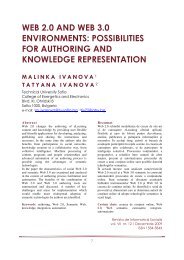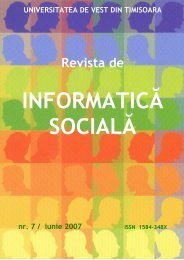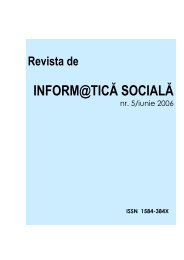Download - Journal of Social Informatics / Revista de Informatica ...
Download - Journal of Social Informatics / Revista de Informatica ...
Download - Journal of Social Informatics / Revista de Informatica ...
You also want an ePaper? Increase the reach of your titles
YUMPU automatically turns print PDFs into web optimized ePapers that Google loves.
Thus, the unprece<strong>de</strong>nted <strong>de</strong>velopment <strong>of</strong> collaborative technology and its successful use in<br />
language learning at tertiary level (Kommers, 1992; Kovacic, Bubas, Zlatovic, 2007a) has<br />
<strong>de</strong>termined us to make a similar attempt to implement a collaborative learning environment<br />
believing that local context adaptations in terms <strong>of</strong> motivation, time and resource constraints are<br />
necessary for ESP/EAP curricula to cater for a variety <strong>of</strong> needs pertaining to general<br />
communication, and pr<strong>of</strong>essional, social and personal <strong>de</strong>velopment. As to the role <strong>of</strong> technology,<br />
we believe in its role <strong>of</strong> “improving learner’s learning experience” and “support real world,<br />
constructivist, collaborative, problem solving learning experiences” (UNESCO, 2002).<br />
2. WIKI-BASED ENGLISH FOR ACADEMIC PURPOSES COURSE<br />
The course in English for Aca<strong>de</strong>mic Purposes for un<strong>de</strong>rgraduate first year (EFL) stu<strong>de</strong>nts enrolled<br />
at the Faculty <strong>of</strong> Sociology and <strong>Social</strong> Work <strong>of</strong> Babes-Bolyai University in Cluj-Napoca is a twosemester,<br />
two hour/week practical course. Various factors, mostly economic and cultural, have<br />
generated constraints that affect the quality <strong>of</strong> the learning process, learning outcomes and the<br />
stu<strong>de</strong>nt / teacher satisfaction. The most obvious are classes comprising more than 30 stu<strong>de</strong>nts with<br />
heterogeneous levels ranging from A1 to C1 (cf. CEFL), and low attendance. Cultural and<br />
psychological factors such as fear <strong>of</strong> change/new and low motivation are beyond the scope <strong>of</strong> our<br />
project but investigations in these areas would certainly bring light to many aspects pertaining to the<br />
learning process.<br />
The major characteristics <strong>of</strong> ESP/EAP courses i<strong>de</strong>ntified by Carver (Carver, 1983) (authentic<br />
material, purpose related-orientation and self direction) are supported by a blen<strong>de</strong>d learning<br />
approach consisting <strong>of</strong> face-to-face practical courses (teacher-driven for the input <strong>of</strong> basic concepts<br />
and gui<strong>de</strong>d practice in reading / writing / presenting for aca<strong>de</strong>mic purposes) and individual/ group<br />
assignments on wiki based resources. Authentic materials are presented in a variety <strong>of</strong> formats<br />
(audio, vi<strong>de</strong>o, multimedia) embed<strong>de</strong>d in a gradual gui<strong>de</strong>d approach (accompanied by reference links<br />
to EAP tutorials from other universities and internet-based activities tutorials adapted to stu<strong>de</strong>nts’<br />
needs) to learning in a Web 2.0 environment. The self direction assumes that learning is not<br />
incremental (learners tend to acquire the language system when they are ready, not necessarily in<br />
the or<strong>de</strong>r they are presented by teachers / course books) and there must be a systematic attempt by<br />
teachers to teach the learners how to learn by teaching them about learning strategies. The results <strong>of</strong><br />
a pre-sessional needs analysis 1 showed that stu<strong>de</strong>nts have a level <strong>of</strong> general English ranging from<br />
A2 to C1 (according to CEFL) and very little knowledge <strong>of</strong> aca<strong>de</strong>mic culture such as genres,<br />
conventions etc.<br />
Pursuant to wiki theory and the rationale mentioned in the first parts <strong>of</strong> this study, we created a web<br />
platform as extension for the blen<strong>de</strong>d learning course in English for Aca<strong>de</strong>mic Purposes. The wiki<br />
platform is based on the wiki hosting service Wikispaces because <strong>of</strong> its <strong>de</strong>ductible and user-friendly<br />
interface that requires only minimum internet skills and can be used after a basic instructional<br />
session.<br />
The structure <strong>of</strong> the wiki space allows for a work-in-progress approach to differentiated learning.<br />
1 As seen by Dudley-Evans and St John (1998: pag. 125) a flexible needs analysis should take into account “learners as<br />
people, as language users and as language learners” [Dudley-Evans, T., St. John, M.J., (1998). Developments in ESP: A<br />
multidisciplinary approach. Cambridge: Cambridge University Press].



